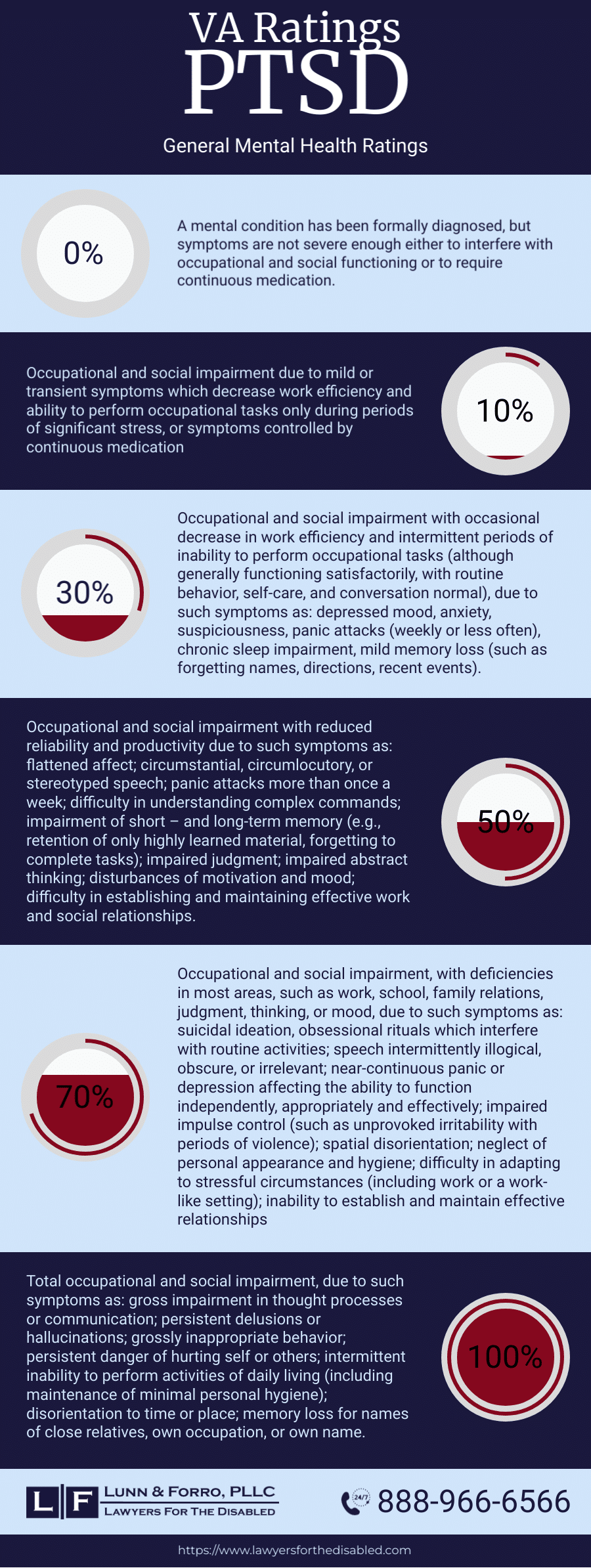If you are a veteran that lives with post-traumatic stress disorder (PTSD), you may qualify for VA disability benefits. Receiving approval for your claim can be difficult and take some time to achieve. It is critical that your understand VA ratings for PTSD. How much you are entitled to will be based on several factors, the most important of which being establishing the severity of your PTSD to the Department of Veteran Affairs.
How the VA Rates Mental Health Conditions
How the VA rates mental health conditions directly impacts the amount and types of benefits you could receive if approved. Normally, the VA takes into account symptoms a veteran is suffering from and translates that information using the General Rating Formula.
When trying to understand the basis of the VA rating system, it’s important to remember that this agency goes by your symptoms that rank the highest and not by their average. For example, if you have three symptoms at 10%, one at 30%, and two at 70%, a rating adjudication of 70% is appropriate.
Another detail to remember is that total disability based on individual unemployability (IU) is not included on this scale. Many veterans are unable to work because of their PTSD symptoms, which qualifies them for IU. If you are in the same situation, you may be able to qualify for payments at the 100% rating amount, even if your overall rating is less than 100%.
Quick Guide of VA Ratings for PTSD

Once you have undergone the C&P exam, the VA will review the findings along with any additional evidence in your claim. The VA rates your PTSD condition using 38 CFR § 4.130, Diagnostic code 9411, which is a schedule of ratings used for mental disorders. This schedule helps adjudicators assign your PTSD a rating that will range anywhere from 0 to 100% with rating thresholds of 10%, 30%, 50%, and 70%. These rating levels describe the level of
impairment, frequency, severity, and duration of mental health disability due to mental health conditions like PTSD.
VA Ratings for PTSD are Based on Symptoms
10% – Your PTSD symptoms are sporadic, or medication minimizes or stops them altogether.
30% – Symptoms of your PTSD condition are manageable but more frequent and interfere with your ability to perform your job, though you can still function satisfactorily.
50% – At this threshold, the VA will focus more on actual symptoms where the previous two ratings assessed effects of PTSD on your daily life.
You will likely receive a 50% rating if your PTSD includes some of the below symptoms:
● Judgment, memory, and/or thought impairment
● Impaired speech
● Panic attacks that occur weekly
● Depressed outlook, and
● Comprehension issues with complex instructions or keeping healthy relationships.
70% – When you reach this level of symptoms, keeping your job may be impossible because symptoms severely interfere with your ability to complete every day tasks.
PTSD symptoms at this threshold include:
● Obsessive focus on rituals
● Uncontrollable emotional outbursts
● Suicidal ideation
● Stressful situations or unmanageable for you
● Constant bouts of panic, anxiety, and/or depression, and
● Inability to maintain personal hygiene.
100% – If your PTSD symptoms have reached this threshold, you are probably unable to live without supervision or leave your home.
PTSD disability symptoms at this level include:
● Hallucinations
● Impairment of thought processes
● Almost entire memory loss,
● Disorientation as to your whereabouts and time, and
● You pose a danger to yourself and others around you.
VA ratings for PTSD rely on extensive detail of your symptoms. Working with a highly qualified VA disability attorney may be a wise choice to ensure any rating the VA assigns is a fair representation of your circumstances.
How to Make a Strong VA PTSD Disability Claim
With this brief understanding of the VA rating system for PTSD, the next step is filing a solid disability claim. Despite the streamlining of the process over the years, you will still face challenges specific to your mental health disorder.
To make a strong claim to receive benefits for your PTSD, you will need to demonstrate these three factors:
● Provide a recent PTSD diagnosis
● Establish the in-service stressor
● Establish a nexus for your PTSD
These three requirements are mandatory components to a successful PTSD compensation claim.
If your claim is denied it makes consulting with an experienced VA PTSD compensation attorney critical. A lawyer that focuses on this area of law will help insure your appeal gets submitted right the first time, as well as help minimize the risk of additional denials or an unfair rating adjudication.
Speak to a Lawyer Who can Advocate for You
Navigating the VA disability process for PTSD is not only complex but information intensive. Having an attorney familiar with this process will often prove invaluable and time-saving.
The team at Lunn & Forro, PLLC, stand ready to help veterans with their claims for VA compensation benefits. To learn more about what benefits are available to veterans, please read our VA Information page. You can also read about how to qualify for ratings for specific medical problems, as well as TDIU and SMC benefits. Thank you for your military service, and we look
forward to speaking with you.



